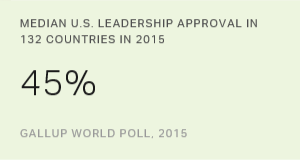Story Highlights
- Median approval of U.S. leadership is 30%, down from 48% in 2016
- U.S. approval dropped substantially in 65 countries and areas
- Germany's leadership now tops that of U.S., China and Russia
WASHINGTON, D.C. -- One year into Donald Trump's presidency, the image of U.S. leadership is weaker worldwide than it was under his two predecessors. Median approval of U.S. leadership across 134 countries and areas stands at a new low of 30%, according to a new Gallup report.
The most recent approval rating, based on Gallup World Poll surveys conducted between March and November last year, is down 18 percentage points from the 48% approval rating in the last year of President Barack Obama's administration, and is four points lower than the previous low of 34% in the last year of President George W. Bush's administration.
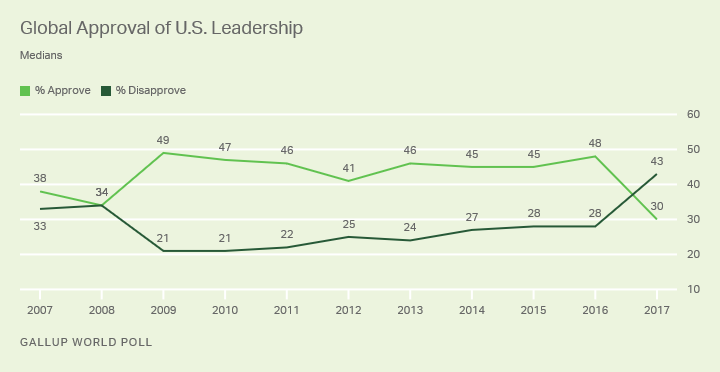
The recent drop in approval ratings is unrelated to the world's being less familiar with the new U.S. administration. The global median who do not have an opinion about U.S. leadership in 2017 (23%) is similar to the 25% in the last year of the Obama presidency.
Instead, disapproval of U.S. leadership increased almost as much as approval declined. The 43% median disapproval, up 15 points from the previous year, set a new record as well, not only for the U.S. but for any other major global power that Gallup has asked about in the past decade.
Big Losses Are Among Close Allies, Few Gains
The relatively fragile image of U.S. leadership in 2017 reflects large and widespread losses in approval and relatively few gains. Out of 134 countries, U.S. leadership approval ratings declined substantially -- by 10 percentage points or more -- in 65 countries that include many longtime U.S. allies and partners.
Portugal, Belgium, Norway and Canada led the declines worldwide, with approval ratings of U.S. leadership dropping 40 points or more in each country. While majorities in each of these countries approved of U.S. leadership in 2016, majorities disapproved in 2017.
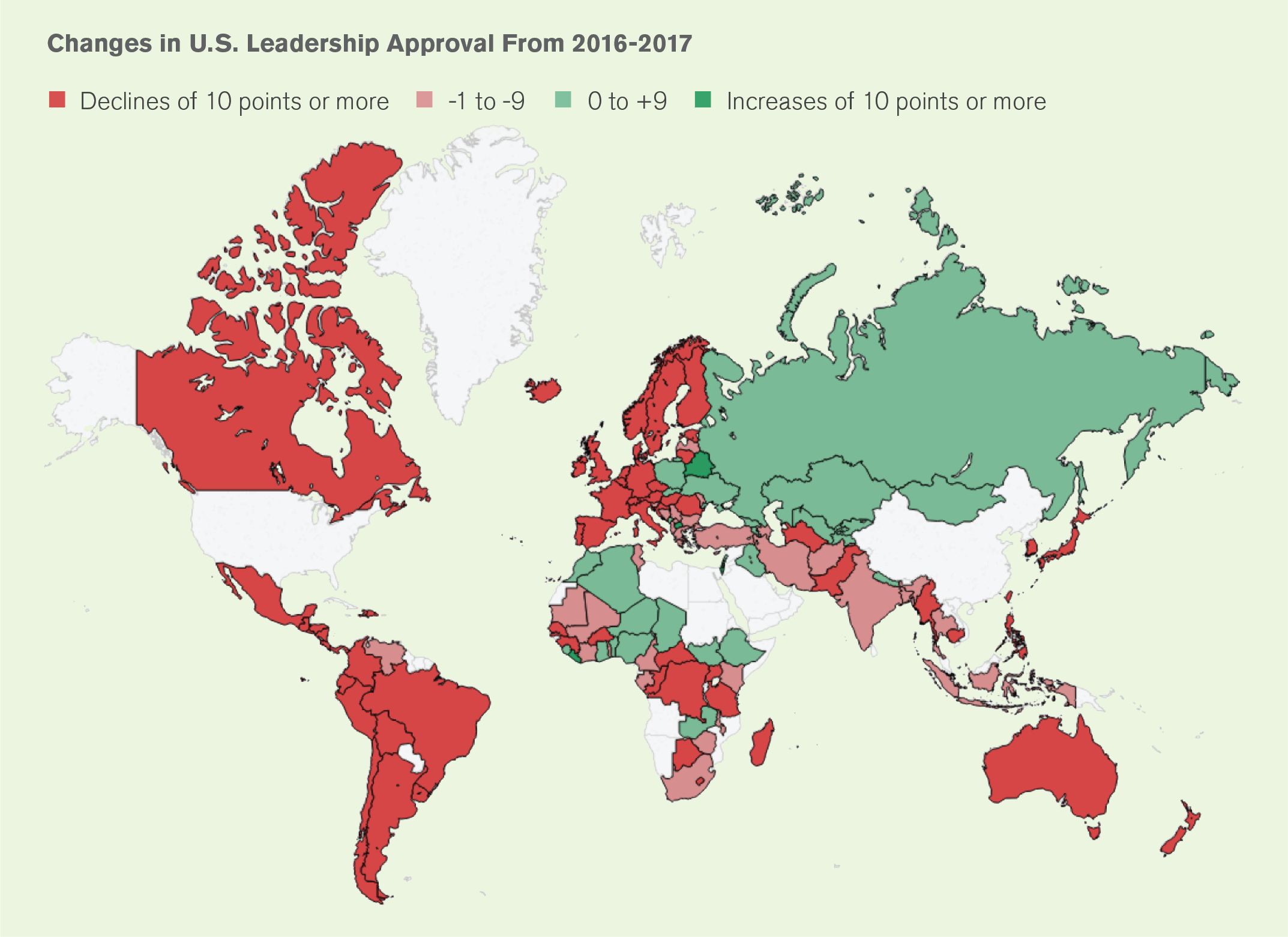
In contrast, U.S. leadership approval increased 10 points or more in just four countries: Liberia (+17), Macedonia (+15), Israel (+14), and Belarus (+11). The 67% of Israelis who approve of U.S. leadership is on par with the ratings Israelis gave the U.S. during the Bush administration. Notably, interviewing in Israel took place before Trump officially recognized Jerusalem as Israel's capital, but he had repeatedly promised to do so during his campaign for president.
U.S. Approval Drops to New Lows in Americas
Regionally, the image of U.S. leadership suffered most in the Americas, where approval ratings dropped to a new low. The median of 24% who approve of U.S. leadership in the region now stands at about half of what it was in the last year of the Obama administration (49%).
Approval of U.S. leadership plunged in every country in the region in 2017. In fact, there were double-digit decreases in all countries except Venezuela, where approval dropped nine points.
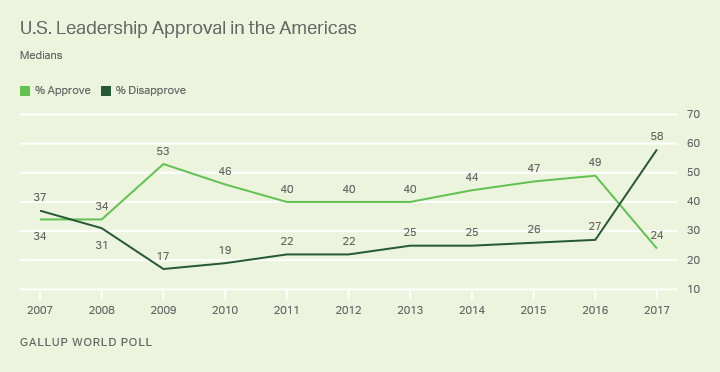
U.S. leadership approval ratings suffered nearly as much in Europe as they did in the Americas; however, the current 25% approval rating there is not the lowest on record -- the ratings during the last two years of George W. Bush's administration still hold that distinction. In Asia, approval dropped to 30%, tying the previous low that Gallup measured during the Bush administration.
Africa as a whole remained the bright spot for U.S. leadership approval, as it has been for the past decade. Nonetheless, the approval rating for the region is at its lowest level yet, clinging to a bare majority (51%) that may be at risk after the president's alleged remarks about the continent last week.
Trump's First Year: Hard Times for U.S. Soft Power
The losses in U.S. leadership approval may have implications on U.S. influence abroad. With its stable approval rating of 41%, Germany has replaced the U.S. as the top-rated global power in the world. The U.S. is now on nearly even footing with China (31%) and barely more popular than Russia (27%) -- two countries that Trump sees as rivals seeking to "challenge American influence, values and wealth."
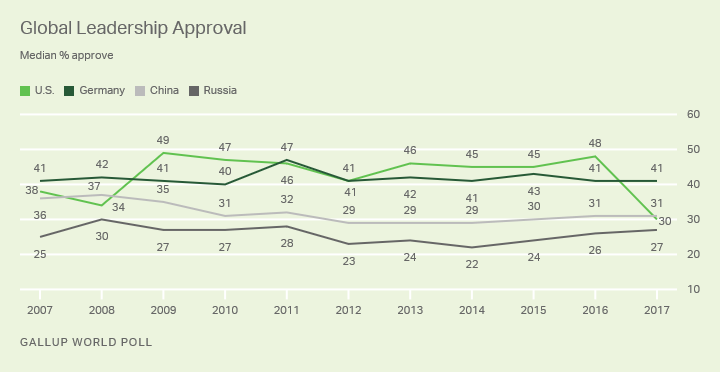
The present situation represents a marked change in the status quo since Obama's presidency, when the image of U.S. leadership remained relatively strong worldwide. In Obama's last year in office, for example, the U.S. led Germany by seven points, China by 17 points and Russia by 22 points.
The current rankings instead look more like a return to the status quo during the last year of the Bush administration -- with Germany on top, followed by China, the U.S. and then Russia -- except now, the U.S. has even more ground to make up.
Implications
It is too early in Trump's presidency to deem his "America First" foreign policy a success or failure. However, it is clear that based on the trajectory of what the world thinks of the U.S., many of the U.S. alliances and partnerships that the Trump administration considers a "great strength" are potentially at risk.
Download the Rating World Leaders: 2018 report.
Gallup Global Managing Partner Jon Clifton discussed the major findings from Gallup's global survey on U.S. leadership on C-SPAN. Watch now.
Survey Methods
Results are based on face-to-face and telephone interviews with approximately 1,000 adults, aged 15 and older, in each country or area. Between March and November 2017, residents in 134 countries or areas were asked to rate U.S., German and Russian leadership, and residents in 135 countries or areas were asked to rate the leadership of China. For results based on the total samples, the margin of sampling error ranges from ±2.0 percentage points to ±5.1 percentage points at the 95% confidence level. The margin of error reflects the influence of data weighting. In addition to sampling error, question wording and practical difficulties in conducting surveys can introduce error or bias into the findings of public opinion polls.
For complete methodology and specific survey dates, please review Gallup's Country Data Set details.
Learn more about how the Gallup World Poll works.


